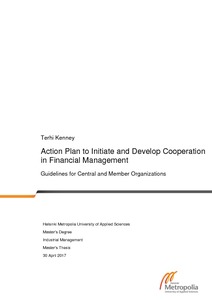Action Plan to Initiate and Develop Cooperation in Financial Management : Guidelines for Central and Member Organizations
Kenney, Terhi (2017)
Avaa tiedosto
Lataukset:
Kenney, Terhi
Metropolia Ammattikorkeakoulu
2017
All rights reserved
Julkaisun pysyvä osoite on
https://urn.fi/URN:NBN:fi:amk-201705199078
https://urn.fi/URN:NBN:fi:amk-201705199078
Tiivistelmä
This study focused on creating and action plan to initiate and develop cooperation in financial management. The focus group consisted of non-profit organizations in child welfare industry.
The organizations are experiencing continuous and rapid changes in their operating environment which means ongoing transformation of financial data and financial management processes. Due to scarce resources in individual organizations, cooperation culture needs to be created to help the organizations save time and share knowledge for better quality performance.
The research approach chosen for this study is action research because its methodology is designed to develop organizations through altering their operating practices. The main data source is personnel interviews in the case organization and the focus group feedback.
The research was carried out by conducting a current state analysis involving the focus group, followed by a literary review around the identified challenge areas. The proposal for an action plan was then formulated joining the information gained from the current state analysis and best practice from literature. The proposal draft was introduced to the focus group and the final proposal was created based on the feedback received.
The main contribution of the action plan is the identification of concrete tasks, specific for the whole focus group, to start creating the cooperation processes forming a cooperation culture. Though the action plan goals are customized for the focus group, this solution in its structural format is transferrable for many similar situations where there is a group of organizations looking for synergies from information/knowledge exchange but are not sure how to go about it.
The study reveals that cooperation can bring many potential benefits including time and cost savings, coherent and comparable figures for transparent fund allocation and detecting trends as well as improved awareness of current issues. However, there is no common understanding of how cooperation should be commenced. The outcome of this Thesis is an action plan for the first steps along this cooperation process.
The organizations are experiencing continuous and rapid changes in their operating environment which means ongoing transformation of financial data and financial management processes. Due to scarce resources in individual organizations, cooperation culture needs to be created to help the organizations save time and share knowledge for better quality performance.
The research approach chosen for this study is action research because its methodology is designed to develop organizations through altering their operating practices. The main data source is personnel interviews in the case organization and the focus group feedback.
The research was carried out by conducting a current state analysis involving the focus group, followed by a literary review around the identified challenge areas. The proposal for an action plan was then formulated joining the information gained from the current state analysis and best practice from literature. The proposal draft was introduced to the focus group and the final proposal was created based on the feedback received.
The main contribution of the action plan is the identification of concrete tasks, specific for the whole focus group, to start creating the cooperation processes forming a cooperation culture. Though the action plan goals are customized for the focus group, this solution in its structural format is transferrable for many similar situations where there is a group of organizations looking for synergies from information/knowledge exchange but are not sure how to go about it.
The study reveals that cooperation can bring many potential benefits including time and cost savings, coherent and comparable figures for transparent fund allocation and detecting trends as well as improved awareness of current issues. However, there is no common understanding of how cooperation should be commenced. The outcome of this Thesis is an action plan for the first steps along this cooperation process.
